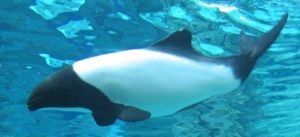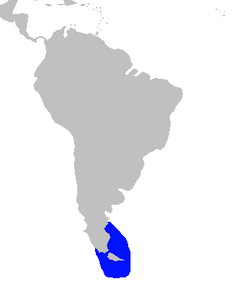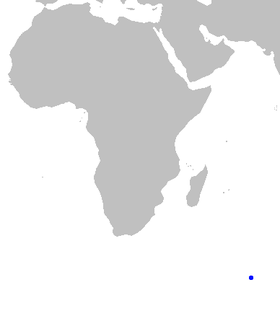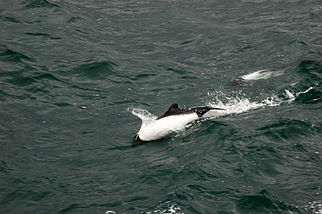- Commerson's dolphin
-
Commerson's Dolphin[1] 
A Commerson's Dolphin in an aquarium. 
Size comparison against an average human Conservation status Scientific classification Kingdom: Animalia Phylum: Chordata Class: Mammalia Subclass: Eutheria Order: Cetacea Suborder: Odontoceti Family: Delphinidae Genus: Cephalorhynchus Species: C. commersonii Binomial name Cephalorhynchus commersonii
Lacépède, 1804
Commerson's dolphin distribution near South America 
Commerson's dolphin distribution near Kerguelen Island Commerson's Dolphin (Cephalorhynchus commersonii) is one of four dolphins in the Cephalorhynchus genus. The species has also the common names Skunk Dolphin, Piebald Dolphin and Panda Dolphin. The dolphin is named for Philibert Commerson, who first described them in 1767 after he sighted them in the Strait of Magellan.[3]
Contents
Physical description
Commerson's Dolphin has a very distinctive patterning. It has a black head, dorsal fin, and fluke, with a white throat and body. The demarcation between the two colours is very clear-cut. This stocky creature is one of the smallest of all cetaceans growing to around 1.5 m (5 ft). A mature female caught off of south Patagonia, at 23 kg (51 lb) and 1.36 m (4.5 ft), may be the smallest adult cetacean on record.[4] Its appearance resembles that of a porpoise, but its conspicuous behaviour (see behaviour below) is typical of a dolphin. The dorsal fin has a long, straight leading edge which ends in a curved tip. The trailing is typically concave but not falcate. The fluke has a notch in the middle. This dolphin has no rostrum. It is not known why their distribution is limited to the southern coast of South America and the Kerguelen Islands.
Sexes are easily distinguished by the different shape of the black blotch on the belly - it is shaped like a teardrop in males but is more rounded in females. Females reach breeding age at six to nine years. Males reach sexual maturity at about the same age. Mating occurs in the spring and summer and calving occurs after a gestation period of 11 months. The oldest known Commerson's Dolphin died at age 18.
Population and distribution
The species is distributed in two locations. The larger population is found inshore in various inlets in Argentina, in the Strait of Magellan and near the Falkland Islands. The second population (discovered in the 1950s) resides near the Kerguelen Islands, 8,000 km to the east of their nearest special cousins. They prefer shallow waters. Global populations are unknown, but the species is accepted to be locally common. A survey in 1984 estimated there to be 3,400 individuals in the Strait of Magellan.
The dolphin is found in two geographically disparate areas:
- the southern coast of South America around Puerto Deseado, Tierra del Fuego and the Falkland Islands, and
- waters near the Kerguelen Islands in the southern part of the Indian Ocean.
Behavior
The Commerson's Dolphin is very active. It is often seen swimming rapidly on the surface and leaping from the water. It also spins and twists as it swims and may surf on breaking waves when very close to the shore. It will bow-ride and swim behind fast-moving boats. They are also known to enjoy swimming upside-down, which is thought to improve the visibility of its prey.
This dolphin feeds on a mix of coastal and pelagic fish and squid. Those in the South American sub-population supplement their diet with crustaceans.
Conservation
The IUCN lists Commerson's Dolphin as Data Deficient in its Red List of Threatened Species. The proximity of the dolphin to the shore makes accidental killing in gillnets a common occurrence. The dolphin was killed for use as crab bait by some Argentinian and Chilean fishermen in the 1970s and 1980s, but this practice has since been curtailed.[citation needed]
The Commerson's dolphin population of South America is listed on Appendix II[5] of the Convention on the Conservation of Migratory Species of Wild Animals (CMS). It is listed on Appendix II[5] as it has an unfavourable conservation status or would benefit significantly from international co-operation organised by tailored agreements.
Captivity
About two dozen Commerson's Dolphins live in aquariums in the world, including SeaWorld San Diego, Aquatica in Florida, Zoo Duisburg in Germany (until 2004), and several aquariums in Japan.
References
- ^ Mead, James G.; Brownell, Robert L., Jr. (16 November 2005). "Order Cetacea (pp. 723-743)". In Wilson, Don E., and Reeder, DeeAnn M., eds. Mammal Species of the World: A Taxonomic and Geographic Reference (3rd ed.). Baltimore: Johns Hopkins University Press, 2 vols. (2142 pp.). ISBN 978-0-8018-8221-0. OCLC 62265494. http://www.bucknell.edu/msw3/browse.asp?id=14300037.
- ^ Reeves, R.R., Crespo, E.A., Dans, Jefferson, T.A., Karczmarski, L., Laidre, K., O’Corry-Crowe, G., Pedraza, S., Rojas-Bracho, L., Secchi, E.R., Slooten, E., Smith, B.D., Wang, JY. & Zhou, K. (2008). Cephalorhynchus commersonii. In: IUCN 2008. IUCN Red List of Threatened Species. Downloaded on 7 October 2008.
- ^ Sharks and Whales (Carwardine et al. 2002), p. 370.
- ^ Wood, The Guinness Book of Animal Facts and Feats. Sterling Pub Co Inc (1983), ISBN 978-0851122359
- ^ a b "Appendix II" of the Convention on the Conservation of Migratory Species of Wild Animals (CMS). As amended by the Conference of the Parties in 1985, 1988, 1991, 1994, 1997, 1999, 2002, 2005 and 2008. Effective: 5th March 2009.
- National Audubon Society: Guide to Marine Mammals of the World ISBN 0-375-41141-0
- Encyclopedia of Marine Mammals ISBN 0-12-551340-2
External links
- Whale and Dolphin Conservation Society
- Convention on Migratory Species page on the Commerson's dolphin
Categories:- IUCN Red List data deficient species
- Oceanic dolphins
- Mammals of Argentina
- Mammals of Chile
- Megafauna of South America
- Fauna of the Atlantic Ocean
- Fauna of the Indian Ocean
- Southeastern South American coastal fauna
Wikimedia Foundation. 2010.


